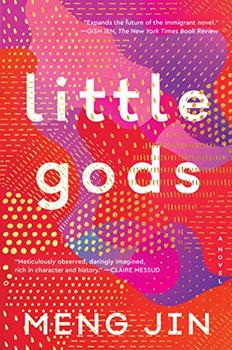Summary | Excerpt | Reading Guide | Reviews | Beyond the Book | Readalikes | Genres & Themes | Author Bio

The End
June 3–4, 1989
From above, the heart of the city is easy to see. Beijing is a bull's-eye. Concentric ring roads close in toward the old city walls, now paved into wide avenues. The avenues form a tight band around the heart: the south-facing gates, the moated palace, the desert square. On a map, diminishing circles draw in the eye, as if to say, Come.
Bodies have come. In the square, bodies sit, stand, and lie on the hot paved stone. The square was built for six hundred thousand bodies; for weeks, there have been more. Rats sniff between folds of newspaper; flies regurgitate on sunburned shins; roaches scuttle across sleeping toes. Women in white uniforms weave through carrying metal tanks, spraying disinfectant where concrete shows. From above, this movement looks like a primitive organism, breathing. In the nucleus a burst of color radiates and contracts, radiates and contracts, as bodies leave the square, return and leave again. West of the outer ring, a dark mass gathers: troops preparing to enter.
In every city and circumstance there are those who will go on with living. In the east quadrant, an old man circles his hutong courtyard for a morning stroll. By the northern lake a young couple wakes to Tian Mi Mi on the radio. South of the train station, three boys race to catch a hen escaping her coop. Between the second and third ring roads, a woman crosses a canal bridge on her walk to work. The woman has a round and candid face, and her hair, striped with white, has been brushed neatly off her forehead. She carries a sensible black purse over her shoulder that has served her for the good part of a decade. She is not chubby but her bones are sturdy, and she commands more space than a woman should.
Normally this woman, a nurse, bikes to the hospital where she works, her lightly permed hair clipped at the base of her neck, a thin shawl draped over her arms to protect her skin from sun. In recent weeks the streets have been too crowded; she has had to take her feet off the pedals and toe her way through. This morning she has decided to walk the two kilometers. She clutches her purse to her side and steps through the people standing in her way. She advances slowly. Sweat beads on her lower back.
She walks past a complex of luxury apartments. In one of the top windows she imagines a woman not unlike herself looking down and shaking her head. She heard once that wives of deposed government officials are given rooms here as a consolation prize, and ever since, she has thought of these buildings as the widows' towers. Whenever she sees them she is reminded of how she wouldn't mind so much being a widow. Being a widow would give her a simple answer for the question of why she has no husband.
The faces crowding the nurse are young, the faces of children. The nurse has never been so foolish as to have children of her own. She learned long ago that she does not like what children grow into. She remembers herself as a high school student, how her grown-up heart felt trapped in her adolescent body. Looking back, it is clear that the opposite was true: her body had been more mature. As a result of this mistake, in the early days of the Cultural Revolution she and her classmates stoned to death their high school physics teacher, a reasonable woman who wore her long hair in a bun at her neck. This is what the nurse sees in the faces of the children around her. A hunger for revolution, any Great Revolution, whatever it stands for, so long as where you stand is behind its angry fist. Little gods, she thinks. Desperate to turn their own growing bodies, their own aches and despairs, into material that might reset the axes of worlds. What did it boil down to but children, giddy with breaking rules!
She arrives at the hospital three minutes past seven and heads to the end of the north corridor. In the nursery her colleague is counting the newborns. There are eight, five boys and three girls, and they are lined up next to each other with the tops of their heads along the wall, swaddled under the incubation lamps like loaves of warm bread.
Excerpted from Little Gods by Meng Jin. Copyright © 2020 by Meng Jin. Excerpted by permission of Custom House. All rights reserved. No part of this excerpt may be reproduced or reprinted without permission in writing from the publisher.
Men are more moral than they think...
Click Here to find out who said this, as well as discovering other famous literary quotes!
Your guide toexceptional books
BookBrowse seeks out and recommends the best in contemporary fiction and nonfiction—books that not only engage and entertain but also deepen our understanding of ourselves and the world around us.